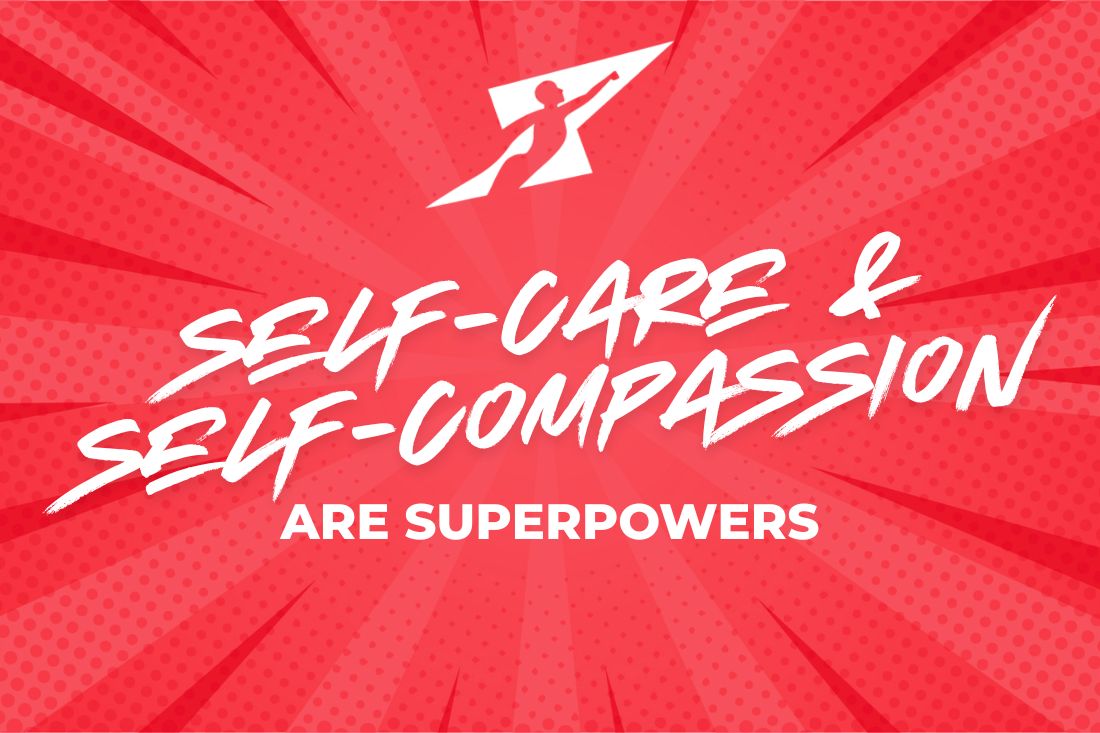Self-Care and Self-Compassion are Superpowers
When it comes to “self-care” our culture has trained us to reach for whatever is easiest to access.
- We buy the latte.
- We book the massage.
- We hit the “treat yourself” button and hope it resets everything.
And, for a moment, it helps.
But then…
- The stress creeps back in.
- The pressure returns.
- The voice inside gets loud again.
This is where most “self-care” stops working—because it never went deep enough to begin with.
It turns out, most of the “self-care” we’ve been sold, is just crisis management.
Today, let’s talk about real self-care, and most importantly, why self-compassion is a superpower.
✉️ Get the Infinite Impact
Join thousands getting weekly wisdom on unlocking hidden potential, building meta-abilities, and creating meaningful change through practical frameworks you can use immediately.
What Gets in the Way
Most of the people I meet want to be better. Not perfect…just, better.
- They want to get more done without burning out.
- They want to be confident in their work without being consumed by self-doubt.
- They want to feel a little more peace, a little more balance, and maybe even feel proud of who they are becoming.
Unfortunately, many of us have been taught to improve by being harder on ourselves.
Push harder. Hustle more. Don’t mess up.
The voice in our head starts to sound less like a coach and more like a drill sergeant.
And when that happens, it’s easy to feel like you’re never doing enough.
If you want to change that voice in your head, find its origin.
It starts with a story.
The Success Narrative

Many of us are raised to believe that our value can be graded.
Our values are heavily influenced by family, friends, school, or society.
We come to believe that our worth is tied to our grades, behavior, or wealth.
So, whenever we fall short, we have an inner voice that’s been built to criticize.
The Work Narrative
We see it on tv and social media. We hear it from family.
Our culture is constantly telling us about the value of hard work.
We have generations of people who imply that rest is something to be earned.
No matter how different the circumstances or how tired you feel, slowing down feels like failure.
So, if you even question whether you are tired, the voice in your head is ready and waiting to call you weak.
The Battle Inside

It’s not that you need a massage, more yoga, or a little treat.
It’s that you need to make peace with the voice inside your own head.
The one that tells you you’re not good enough, not far enough, not doing it right.
This is the part that hurts the most — realizing that the voices you can’t escape, are you.
How to Build the Superpower of Self-Compassion
Real growth starts when we treat ourselves with compassion.
That means learning a different way to respond to stress, mistakes, and even failure.
It means replacing that inner drill sergeant with someone who is still honest and clear, but also kind.
And that takes practice. But, if that voice can change — if you can rewire it, retrain it, repurpose it — everything changes.
Step 1: Awareness
You can’t practice self-compassion until you see the places where it’s missing.
So, take a moment to examine the narratives you’ve internalized.
Ask yourself: What do I say to myself when I mess up? When I miss a deadline? When I drop the ball?
And more importantly: Whose voices are those and where did it come from?
Step 2: Intention
Decide who you want to be in relationship with yourself.
Are you going to keep treating yourself like a project to fix?
Or can you choose to speak to yourself like someone you care about?
This isn’t about ignoring your flaws. It’s about accepting your humanity.
The easiest way to get over this is to set your sights on something bigger than yourself. Allow yourself to be a vessel in service of something more profound.
Step 3: Practice

Once you’ve gone through the previous two steps, it’s time to do the work. Because self-compassion is not a one-time realization, it’s a daily effort, and it helps to have tools.
Here are three simple ways to begin:
1. Start your day with a kind word to yourself
Before you get out of bed, say something to yourself that sets a tone of care.
- “I am worthy of love and respect.”
- “I don’t need to be perfect to be valuable.”
- “I will do my best today, and that is enough.”
2. End your day with a reflection
Write down one thing you’re proud of or one moment you treated yourself with compassion.
You don’t need to write a lot—just enough to stay aware.
3. Interrupt your harshest moment
This one will be the hardest.
Each day, find one instance where you’re being hard on yourself.
Pause. Take a breath. Say to yourself: “I’m doing my best. I can grow without shame.”
Then start to reframe the story.
Ask yourself one of these questions: What else could be true? What do I know for sure? What’s another explanation?
These questions can help you see your experience from a different angle—one that holds space for both truth and compassion.
Could this be a moment of miscommunication, a lack of clarity, or something beyond your control? Could it be that you are not the sole cause of the outcome?
Some days, you’ll forget. Some days, you’ll fall back into old patterns. That’s normal.
Just begin again. That’s part of the practice, too.
What Changes When You Practice
This is an incredible powerful superpower, and I hope you will begin the practice.
When we learn to treat ourselves with compassion, everything else begins to shift.
- We become less reactive, less defensive.
- We build stronger relationships because we’re not secretly projecting our self-judgment onto others.
- We take risks without the constant fear of failure.
- We recover faster when things go wrong.
We stop needing to prove our worth and start moving with clarity and peace.
This doesn’t just change your life. It changes the lives of people around you. Because self-compassion is contagious. When you model it, others begin to feel it, too. They soften. They open up. They start to believe they are allowed to be human, too.
And the more of us who learn to live that way, the more the world becomes a place where people are safe to grow, to rest, and to show up as their full selves.
It won’t be easy at first. But every day you practice it, it will get easier.
Start today.
I hope you enjoyed this post!
If you liked this post, then you will LOVE my newsletter (The Infinite Impact)
and my learning community (The Superhero Institute).


